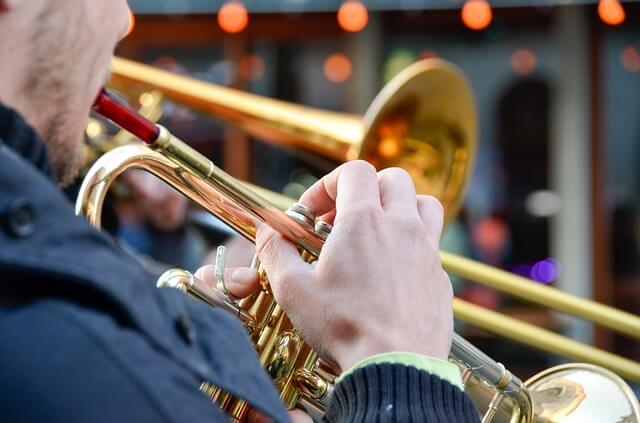Playing the trumpet can be a lot of fun, but it can also be quite taxing on your lips. It’s a common phenomenon to have trumpeters complaining of bruised and weary lips after a couple of hours of training sessions or performances. In this post, we’ll take a look at some of the reasons why your lips might get tired when you play the trumpet and suggest some tips for avoiding lip fatigue.
Reasons why your lips might get tired when you play the trumpet
1. Way too much Pressure
This accounts for 70% of the reasons given by trumpet players. Lips are made up of soft muscles, and putting too much pressure on them as a result of poor technique weakens them over time.
When users increase their range, they frequently experience sore or bruised lips as a result of pressing the mouthpiece too tightly against their lips. When players stretch their lips to generate notes, the pressure builds up. To avoid this, one must be accustomed to playing the trumpet with reduced mouthpiece pressure.
2. Bad posture
This may come as a surprise, but beginners sometimes neglect this factor. When playing the trumpet, it is important to remember that posture is quite important.
Air is blown into the mouthpiece of the trumpet to make it work. As a result of this large volume of air being expelled from the lungs, poor posture such as leaning and slouching might prevent the lungs from fully expanding, contributing to poor breath control.
Consequently, one may try to compensate by overstretching the lips, resulting in bruised and weary lips.
3. Smiley Embouchure
When beginners get tired of playing, they adopt this unhealthy technique (even trombonists are culprits to this). Exhausted students discover that instead of contracting the embouchure muscles, they can keep it tight by widening the edges of their mouth into a smile — essentially stretching the lips very thin.
This approach should be avoided since it restricts flexibility and precision, as well as causing long-term damage to the lips.
4. Lack of warm up exercises
Trumpet playing, like athletics, necessitates some flexibility exercises. These exercises are designed to strengthen the facial muscles and the muscles of the lips. Lack of training makes one prone to lip injuries and fatigued lips in a short period of time.
5. Puffed Cheeks
This is an easy one to spot and usually very simple to fix. To puff out one’s cheeks while playing is a bad habit that is usually only observed by new players.
Puffy cheeks actually slow the rate at which air enters the mouthpiece and should be avoided because they can cause the embouchure and the Buccinator muscles of the mouth to deteriorate or dilate, a condition known as Glass Blower’s cheeks.
Here are some tips for keeping your lips from becoming too weary after a practice session, as well as some important healthy techniques to master in order to be able to play the trumpet tirelessly:
-
Learn to play the trumpet with less mouthpiece pressure
You’ll need to practice your “no-pressure notes” if you want to play the trumpet with less mouthpiece pressure. You’ll also need to work on your embouchure and air efficiency.
Keep the pressure on your bottom lip, and watch how you handle the trumpet. Instead of forcefully clutching the trumpet with your left hand, be aware of it and relax a little; the goal is to naturally eliminate the weight (pressure from your lips). To reduce the pressure and tension from your playing, be conscious of how you lift and hold the instrument.
-
Maintain a good body posture
It’s essential that a player’s feet are flat on the floor and not bowed or slanted, that shoulders are perfectly in line with hips so that enough pressure can be generated from the lungs, and, most importantly, that a player seems to be standing up straight even while seated. This allows you to transfer enough pressure from your hips to your lips (without necessarily straining your lips to produce them)
-
Try playing in front of a mirror
To puff out one’s cheeks while playing is a deleterious habit that most beginning players develop. Playing in front of a mirror is an incredible way to detect yourself when you’re playing with puffy cheeks and correct it forthwith.
-
Learn to take a rest
Just like I stated earlier, playing the trumpet is enough exercise and much like athletes, one must know when to rest and let the lips recuperate after exhaustion. Building the lips requires patience and time and mustn’t be rushed.
-
Keep your mouth clean!
Despite the fact that this is true for children, adults are occasionally found wanting in situations like these. Before practicing with the instrument, a player should ensure that his or her mouth is clean.
Keeping your mouth clean while playing protects your instrument and allows air to move freely through your horn. Otherwise, food crumbs in the mouth build up around the valves, slowing down the slides and producing an unpleasant sound.
To compensate for the slowed pace, players apply greater pressure than usual, which is hardly professional.
-
Master the Tongue Buzz
When learning to play the trumpet, some students learn to produce buzz with their tongue rather than their lips. Because it’s difficult to see a student’s embouchure inside the mouthpiece, this practice could go unnoticed in a band of trumpeters.
Only the lips brushing against each other and the mouthpiece should make a buzz. Tongue buzz produces a poor tone, restricts range and flexibility, and needs articulation of the breath.
-
Take flexibility exercises like lip flapping
This exercise will cause all of your facial muscles to relax. To obtain the best results, make the sound of a horse flapping its lips. The lower the pitch, the greater the benefit. Your face muscles will start to tingle gradually hence loosening up your lips.
Final thoughts on why your lips might get tired when you play the trumpet
Poor habits and techniques are easier to correct for beginners than for advanced users who are already conditioned to them. As a result, this will not be an entirely difficult experience for you. The lips are a delicate tissue that is essential for playing the trumpet. As a result, precautions must be taken to avoid bruising it or tiring it out too quickly as a result of poor technique.







